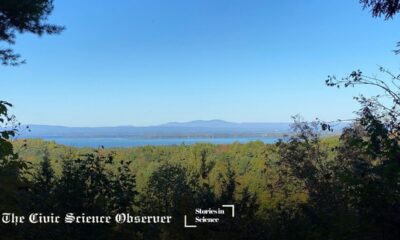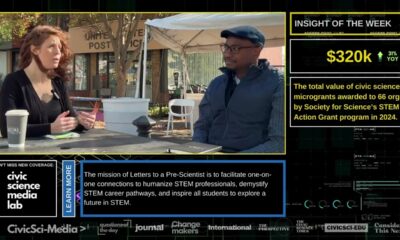Stories in Science Special Series
How Science Hobbies Shaped My Life
To me, science isn’t just about discovering new theories and laws. It’s also about engaging in a deeper way with our world through intuition, observation, and formal education.

– Branden Loizides –
[su_boxbox title=”About” box_color=”#262733″]With over twenty years of experience in the IT industry, Branden currently works as a Systems Administrator for Harvard Law School. He studied computer science at Purdue University and the University of Massachusetts Lowell. When not engaging in his day job, Branden enjoys amateur programming, his cats, and his multitude of hobbies. He recently began researching an idea for a potential new hobby: hydroponics![/su_boxbox]
[su_boxnote note_color=”#e7e7e3″]Story Summary
- You don’t have to be a ‘scientist’ for science to have a significant impact on your life.
- Science isn’t just a subject in school. It’s a part of our everyday lives. Science may be an integral part of your life and you may not even realize it.[/su_boxnote]
[su_boxbutton url=”https://storiesinscience.org/wp-content/uploads/2018/03/Loizides_Branden-Stories-in-Science.pdf” target=”blank” background=”#2dbfef” icon=”icon: cloud-download”]Download the Story[/su_boxbutton]
[dropcap]S[/dropcap]cience has always been a part of my life. At a young age, I had a yearning to understand how and why things worked. From my earliest days of schooling, science was always one of my favorite subjects. I enjoyed the core sciences such as biology, chemistry, and physics. But my particular area of interest fell to a slightly different science.
I recall way back to third-grade where my class was performing an experiment to understand how seeds grow. The classroom was divided into four groups and each group received a potting cup and a few bean seeds. One group was told to put soil in their cup, plant the seed, and place it in the sunlight with water every day. Another group received soil and water for their bean, but no light. A third group got water and light, but no soil to put the bean in. Lastly, the bean for my group didn’t get light or soil, but still got water. At the time, I found it fascinating to see the results for the different treatment groups. Unfortunately, my group’s seed did not do too well. It seems like a silly experiment now, but it really opened my eyes to what a “science experiment” entails. This is on a very primitive level, of course, but it got my mind thinking in a new way.

Branden Loizides
Around this time, our family was fortunate enough to own an Atari 400 and this encouraged me to start dabbling in computer programming (it was 1983-84 and this was a personal computer, not to be confused with the Atari 2600, one of the first game consoles from the late 70s). I began copying programs written in BASIC from magazines such as Enter, Family Computing, or K-Power. Before too long, I was able to figure out how the program was put together. I was even able to write some of my own programs! Little did I know I was learning skills that would later make my career.
It was also around this time when I got my first chemistry set. You can’t really get those anymore, which is unfortunate, but I remember me and my friend following the book of experiments, mixing chemicals together to get different colors and aromas. I also learned how to read the periodic table of elements. I knew the abbreviations for most elements and even knew some of their atomic weights! Chemistry was a lot of fun and I continued to enjoy chemistry through my high school years, being especially fascinated by and talented in stoichiometry.
To me, science isn’t just about discovering new theories and laws. It’s also about engaging in a deeper way with our world through intuition, observation, or formal education.
A few years later, in 1986, I discovered one of my favorite science subjects of all time: astronomy. I fell into the hype of Halley’s Comet flying through the inner solar system for the first time in 75 years. I got my first telescope and observed craters on the moon. It was so much fun! Around the same time as Halley’s Comet was flying by, we got our first-ever close-up pictures of the planet Uranus, thanks to Voyager 2. I still remember reading in the Boston Globe, “Sixth Moon Discovered Orbiting Uranus.” That was weeks to months before the fly-by and I was already excited! I stuck with astronomy for a long time, joining the Astronomy Club in high school and acquiring a bigger and better telescope at home. It was absolutely amazing the first time I looked at Jupiter through a telescope and observed the Galilean satellites. Nothing is more spectacular than the first time you see Saturn’s rings, although, observing the Orion Nebula is also stunning. I had the pleasure of viewing the eight planets through a telescope, even though there were technically a total of nine planets back then.
In high school, I entered the world of model rocketry. At first, it was just a fun way to launch rockets made of paper and balsa wood, but we ended up taking it even further. We used trigonometry to calculate how high the rocket went by simply measuring the distance from the launch pad and using a protractor to measure the angle of the rocket at its highest point. At the time, I had decided I wanted to be an astronaut someday, but more realistically, an astrophysicist. Although that never happened, I did start off in college as a physics major. Unfortunately, despite my interest and efforts, I had a very difficult time getting through Calculus. If you can’t do Calculus, you can’t do advanced physics!
While also in high school, I was an avid aquarist. I had several successful freshwater aquariums where the science was pretty simple. Later, as an adult, I moved on to salt water aquariums and the science behind my aquarium hobby became more advanced. Getting all these mechanisms right and ensuring that the salt-water aquarium was habitable, involved lots of learning and exploring new science for me. Genetics fascinated me, but I found the biology involved too much memorization for my taste; that and, I’ll be honest, I just didn’t ‘get’ biology. I know what it is and I appreciate its significance. However, I struggled grasping even the basic concepts. I still can’t figure out Punnett Squares which, from what I’m told, are stupidly simple.
The pinnacle of my aquarium hobby was when I rescued a baby green moray eel, just 12 inches long. We named him “Stinky.” I put him into a 150-gallon aquarium and watched him grow. I had to track his diet, the amount of waste he produced, etc… But more interestingly, I got to observe the behavior of a green moray eel on a daily basis. It was mesmerizing. After a couple years, Stinky was quickly outgrowing the 150-gallon tank and I was phasing out of my aquarium hobby. Fortunately, the New England Aquarium was kind enough to take Stinky in and put him in their giant central Ocean Tank. He’s still there today (very unflatteringly renamed Thomas), measures about 6-7 feet long and gets hand-fed three times a day! Stinky became the luckiest green moray eel on the planet! You can watch him swim with the aquarium divers, and see what he looks like now, right here:
Anyway, after some trial and errors, I ultimately ended up pursuing a computer science degree in college. There are those out there that do not consider computer science to be a science and I’m among those people. But I suppose it depends on how you define “science.” If you consider science to be the natural sciences – like physics, chemistry and biology – then no, computer science is not a science. On the other hand, there is a lot of research and discovery in computer science. For example, when you consider the field of artificial intelligence, it’s groundbreaking territory that could take our civilization places that we’ve only seen in movies and comic books! My career today is in the Information Technology field. I do not have much interaction with the natural sciences from a career standpoint, but science will always be an integral part of my formative years. It’s a subject that I cherish and if I could go back and do things differently, I would have pursued my passion for astronomy and astrophysics more aggressively.
Even though my profession today is not in the natural sciences, I feel fortunate to have had science in my life throughout the years. Getting involved with science through hobbies gave me a very rich childhood and helped shape my adult personality in many intangible ways. To me, science isn’t just about discovering new theories and laws. It’s also about engaging in a deeper way with our world, through intuition, observation, or formal education.
We all learned what happens when you mix an acid and base together. But didn’t you love the first time you mixed baking soda and vinegar together? Or the first time you looked at the moon through a telescope? Being a science hobbyist has instilled an undying sense of curiosity and exploration in me. I hope that more people can enjoy these virtues by engaging in science related hobbies. Science is more than a profession, it’s an aspect of our society that can lead us to think in new directions, meet new people, and have a better understanding of our world and universe.
Cover Image by Pete Linforth from Pixabay | CC0 Creative Commons
Metrics
Sessions
Total number of Sessions. A session is the period time a user is actively engaged with the page.
Visitors
Users that have had at least one session within the selected date range. Includes both new and returning users.
Page views
Pageviews is the total number of time the article was viewed. Repeated views are counted.
The CS Media Lab is a Boston-anchored civic science news collective with local, national and global coverage on TV, digital print, and radio through CivicSciTV, CivicSciTimes, and CivicSciRadio. Programs include Questions of the Day, Changemakers, QuickTake, Consider This Next, Stories in Science, Sai Resident Collective and more.

-
Audio Studio1 month ago
“Reading it opened up a whole new world.” Kim Steele on building her company ‘Documentaries Don’t Work’
-
 Civic Science Observer1 week ago
Civic Science Observer1 week ago‘Science policy’ Google searches spiked in 2025. What does that mean?
-
Civic Science Observer1 month ago
Our developing civic science photojournalism experiment: Photos from 2025
-
Civic Science Observer1 month ago
Together again: Day 1 of the 2025 ASTC conference in black and white
Contact
Menu
Designed with WordPress
























